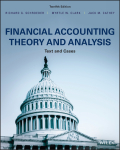
EBK FINANCIAL ACCOUNTING THEORY AND ANA
12th Edition
ISBN: 9781119299646
Author: CATHEY
Publisher: JOHN WILEY+SONS,INC.-CONSIGNMENT
expand_more
expand_more
format_list_bulleted
Question
Chapter 5, Problem 5.1C
a)
To determine
To state : Reasons for preference of stable earnings trend by managers.
a)
Expert Solution
Explanation of Solution
Managers prefer stable earnings trend because of the following reasons:
- Stable earnings make the company look less risky for investors and therefore, it stabilizes the stock price of the company.
- Stable earnings allow the company to better
forecast future performance. - Stable earnings help the company in making informed capital budgeting decisions.
- Stable earnings allow the company to provide stable dividends.
- Stable earnings reflect better on the performance of managers and there are better compensated.
b)
To determine
To state : Methods business managers might use to smooth earnings.
b)
Expert Solution
Explanation of Solution
Following methods can be used by managers to smooth earnings:
- Earnings may be reduced or increased by altering the estimate of provisions, such as provision for employee costs.
- Earnings may be reduced or increased by differing recognition of expenses or incomes to the next period.
- Earnings may be made smooth by altering the amount of
depreciation by recognizing impairment losses or by differing capital investments. - Earnings may be made smooth by recognition of unlikely expenses or revenue.
- Earnings may be made smooth by differing non-recurring income.
Want to see more full solutions like this?
Subscribe now to access step-by-step solutions to millions of textbook problems written by subject matter experts!
Students have asked these similar questions
Give me true answer this accounting question
Question 7
Please need answer the general accounting question
Chapter 5 Solutions
EBK FINANCIAL ACCOUNTING THEORY AND ANA
Knowledge Booster
Similar questions
- Belle Garments manufactures customized T-shirts for football teams. The business uses a perpetual inventory system and has a highly labour-intensive production process, so it assigns manufacturing overhead based on direct labour cost. The business operates at a profit margin of 33% on sales. Belle Garments expects to incur $2,205,000 of manufacturing overhead costs and estimated direct labour costs of $3,150,000 during 2025. At the end of December 2024, Belle Line Garments reported work in process inventory of $93,980 - Job FBT 101 - $51,000 & Job FBT 102 - $42,980 The following events occurred during January 2025. i) Purchased materials on account, $388,000. The purchase attracted freight charges of $4,000 ii) Incurred manufacturing wages of $400,000 iii) Requisitioned direct materials and used direct labour in manufacturing. Job # FBT 101 FBT 102 FBT 103 FBT 104 Direct Materials $70,220 97,500 105,300 117,000 iv) Issued indirect materials to production, $30,000. Direct Labour $61,200…arrow_forwardThe trial balance for K and J Nursery, Incorporated, listed the following account balances at December 31, 2024, the end of its fiscal year: cash, $27,000; accounts receivable, $22,000; inventory, $36,000; equipment (net), $91,000; accounts payable, $25,000; salaries payable, $10,500; interest payable, $6,500; notes payable (due in 18 months), $41,000; common stock, $72,000. Determine the year-end balance in retained earnings for K and J Nursery, Incorporated.arrow_forwardWhat would be the total production engineering cost per unitarrow_forward
arrow_back_ios
SEE MORE QUESTIONS
arrow_forward_ios
Recommended textbooks for you
 Financial Reporting, Financial Statement Analysis...FinanceISBN:9781285190907Author:James M. Wahlen, Stephen P. Baginski, Mark BradshawPublisher:Cengage LearningPrinciples of Accounting Volume 1AccountingISBN:9781947172685Author:OpenStaxPublisher:OpenStax CollegePrinciples of Accounting Volume 2AccountingISBN:9781947172609Author:OpenStaxPublisher:OpenStax College
Financial Reporting, Financial Statement Analysis...FinanceISBN:9781285190907Author:James M. Wahlen, Stephen P. Baginski, Mark BradshawPublisher:Cengage LearningPrinciples of Accounting Volume 1AccountingISBN:9781947172685Author:OpenStaxPublisher:OpenStax CollegePrinciples of Accounting Volume 2AccountingISBN:9781947172609Author:OpenStaxPublisher:OpenStax College Managerial Accounting: The Cornerstone of Busines...AccountingISBN:9781337115773Author:Maryanne M. Mowen, Don R. Hansen, Dan L. HeitgerPublisher:Cengage Learning
Managerial Accounting: The Cornerstone of Busines...AccountingISBN:9781337115773Author:Maryanne M. Mowen, Don R. Hansen, Dan L. HeitgerPublisher:Cengage Learning
 Intermediate Financial Management (MindTap Course...FinanceISBN:9781337395083Author:Eugene F. Brigham, Phillip R. DavesPublisher:Cengage Learning
Intermediate Financial Management (MindTap Course...FinanceISBN:9781337395083Author:Eugene F. Brigham, Phillip R. DavesPublisher:Cengage Learning

Financial Reporting, Financial Statement Analysis...
Finance
ISBN:9781285190907
Author:James M. Wahlen, Stephen P. Baginski, Mark Bradshaw
Publisher:Cengage Learning

Principles of Accounting Volume 1
Accounting
ISBN:9781947172685
Author:OpenStax
Publisher:OpenStax College

Principles of Accounting Volume 2
Accounting
ISBN:9781947172609
Author:OpenStax
Publisher:OpenStax College

Managerial Accounting: The Cornerstone of Busines...
Accounting
ISBN:9781337115773
Author:Maryanne M. Mowen, Don R. Hansen, Dan L. Heitger
Publisher:Cengage Learning


Intermediate Financial Management (MindTap Course...
Finance
ISBN:9781337395083
Author:Eugene F. Brigham, Phillip R. Daves
Publisher:Cengage Learning